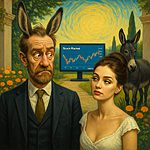
John Hussman: The Missteps of Crash Predictions from Market Experts
Updated Aug 27, 2024
Stock market experts are not always right about market crashes. They often sell during a crash instead of before and sacrifice long-term gains. They tend to focus too much on short-term fluctuations rather than long-term growth. As the renowned author Mark Twain once quipped, “An expert is just some guy from out of town.”
Stock market experts get it wrong because they are fixated on short-term gains and losses. They panic sell during crashes out of fear, causing them to miss out on future rebounds. In this way, they are not so different from amateur investors. Kurt Vonnegut, who lived through the Great Depression, satirized this shortsighted behaviour in his novel Slaughterhouse-Five. He imagined aliens putting humans in a zoo with a stock ticker and brokerage phone, watching them frantically trade based on every price move.
Experts also fail to properly account for the stock market’s inherent cyclicality and unpredictability. As Vonnegut’s son Mark, who suffered from mental illness, wisely noted, “Whatever shrink happens to be standing around when such remissions occur is usually willing to assume credit.” Similarly, market gurus take credit when their predictions pan out, but there are always many complex factors driving crashes that no one can reliably foresee.
Famed investor and Renaissance man John Law, who triggered a massive stock market bubble in 18th-century France, exemplifies the dangers of overconfidence. Despite his brilliance, Law’s Mississippi Company scheme collapsed spectacularly. As Twain also said, “It ain’t what you don’t know that gets you into trouble. It’s what you know for sure that ain’t so.”
The powerful Medici banking family of the Italian Renaissance serves as another cautionary tale. Their financial empire crumbled after years of success when they failed to adapt to changing conditions. As Vonnegut wrote, “The hand that stocks the drug stores rules the world.” In other words, those who control capital wield immense power but are not immune to downfalls.
Ultimately, stock market experts are often vested in making rosy predictions. If they forecasted crashes, it could spook investors and become a self-fulfilling prophecy. Instead, they maintain an optimistic facade while quietly cashing out their holdings, as observed by the Tactical Investor.
Investors should take expert prognostications with a grain of salt and stay focused on long-term fundamentals rather than short-term noise. Vonnegut said, “Peculiar travel suggestions are dancing lessons from God.” In the chaotic dance of the stock market, the best approach is often to ignore the would-be experts and forge your path with discipline and rationality.
Why Stock Market Experts Are Wrong About Market Crashes
Naysayers get it right once and use that one event to highlight their prowess; they purposely fail to list the countless times they were wrong in the past. Moreover, experts like John Hussman fail to mention that you had listened to them. You would have been bankrupted several times over in the process. They are only standing because they conned you into paying for this crappy. However, they did not act on it; had they worked on it, the dog house would be their home.
John Hussman, the president of the John Hussman Investment Trust, is a seasoned investor and a PhD in economics from Stanford University. He warned investors not to expect much returns from stocks or bonds and predicted that the S&P 500 would return no more than 1% on average over the next decade. He believes the current market environment is “the most broadly overvalued moment in market history” and warned of a potential 60% plunge in the stock market.
John Hussman uses his own proprietary measure of the market, which looks at the value of all non-financial stocks relative to a specialized earnings measure called value-added. According to his analysis, the market is as overvalued as it was in 2007 and is just 5% away from its lofty valuations right before the peak in 2000. Fortune
This is true, but one has to adjust to the mass mindset. What worked yesterday will not work today or tomorrow, especially in the era of forever QE. The last time John Hussman got it correct was over 16 years ago, probably the main reason he is no longer managing a billion-dollar fund.
Stock Market Outlook by Gerard Celente
“We’re forecasting the economy is not going to rebound with the economic proposals that are in place now. The global situation has created an environment for financial panic. The financial panic conditions have been in place for quite a while. Trump’s victory has played it off for a bit, but on the negative side, you still have the debt and interest rates going up and the debt that has to be paid. On gold, we believe right now is near its bottom.” USA Watchdog
Stock Market Outlook by none other than the expert with the most dismal record, Marc Faber
“2017 will be [when] the US economy causes a World Economic Collapse! Trump can’t stop a dollar crisis, stock mark crash or gold and silver prices from skyrocketing! “
Harry Dents Stock Market Outlook
“While many economists will argue that gold is not in a bubble… and insist it will soar to $2,000, $5,000 and even $10,000, my research has said otherwise. I’ve never been more certain of anything in over 30 years of economic forecasting.”
Stock Market Outlook from Peter Costa
“I think that a lot of these stocks, big cap, small cap, they all got ahead of themselves. And I think there will be a correction to bring them back to some sort of normalisation in pricing, and once it gets back there, I’ll be back in the market.” CNBC
Marc Faber: The Broken Clock That’s Always Wrong
Stock Market Outlook & Predictions by Laurence Kotlikoff
This chap recently sold all of his stocks. You should, too, he says, if you want to avoid a coming market crash.“If your stocks and long bonds are in retirement accounts, transfer them to short-term Treasurys,” he wrote. Seattle Times
Jim Rogers Stock Market Outlook
“A $68 trillion ‘Biblical’ collapse is poised to wipe out millions of Americans.” Market Oracle
Stock Market Outlook from the Tactical Investor: we look at the trend, not the hysteria factor.
Insanity of the Experts and the Importance of Changing Your Angle of Observation
The video above exposes the fallacy of relying on experts to predict the stock market’s future. Instead of providing sound advice, these individuals recycle the same outdated ideas and hope to strike gold occasionally. The fact is, they are often wrong, and their mistakes can cost investors dearly. Those who follow them are even more misguided.
As Albert Einstein once said, “Insanity is doing the same thing repeatedly and expecting different results.” Market experts repeatedly make the same mistakes, leading to poor investment decisions.
Mass psychology supports the notion that during a stock market panic, it’s time to buy, and during euphoric times, it’s time to sell. In a follow-up video, we emphasize that stock market corrections and crashes should be viewed positively, as they present an opportunity to buy stocks at a discount. Experts often exaggerate the risk of financial catastrophes, as fear sells and can lead to rash decision-making.
By changing our perspective and seeing market corrections as opportunities rather than disasters, we can avoid the fear that clouds our judgment and make better investment decisions. Let us not be drained of our precious energy by fear but instead use it towards more fruitful endeavours. Life is short, and it’s up to us to make the most of it.
Selling Before the Market Crashes: The Art of Timing
Selling before the market crashes is no easy feat, old chap. It demands discipline and a long-term perspective. While it may seem straightforward, selling before a crash doesn’t mean you’ll exit at the absolute peak. If aiming for the very top is your goal, you might find yourself continually missing the mark.
To effectively position yourself before a downturn, consider the following indicators:
1. Investor Sentiment: When bullish sentiment readings persist above 55 for several weeks, it’s a clear signal that the market may be nearing its peak. Extreme optimism often signals that a correction is on the horizon.
2. Market Overbought Conditions: Watch for markets trading in the extremely overbought range on monthly charts. This technical indicator suggests that stocks are priced beyond their intrinsic value and could be due for a pullback.
3. General Investor Expertise: When the average investor becomes overly confident and starts considering themselves an expert, it often marks the final phase of a bull market. This shift in public sentiment can be a warning sign to secure your profits.
Selling before a market crash involves more than just timing; it demands a willingness to let go of short-term gains for long-term stability. It requires the discipline to resist the lure of continued upward momentum and hold cash when valuations are inflated.
Many investors succumb to the allure of short-term gains and suffer significant losses when the market corrects. This often stems from a fear of missing out (FOMO) rather than a measured approach.
A contrarian mindset, on the other hand, can be immensely rewarding. By selling before the crash and buying back at lower levels, you position yourself for substantial gains. This strategy requires patience, courage, and a readiness to stand apart from the crowd.
In an era of instant gratification, this contrarian approach may seem counterintuitive. Yet history proves it to be a robust strategy for achieving long-term success. So, instead of following the herd, lead your investments with insight and strategy and position yourself to capitalize on future opportunities.
Investing for Long-Term Growth
Another way to avoid making the same mistakes as stock market experts is to focus on long-term growth. This means investing in stocks with a strong track record of growth over time rather than trying to make quick profits by buying and selling stocks quickly. By investing for long-term growth, you can avoid the temptation to sell during a market crash and miss out on long-term gains.
In conclusion, stock market experts are not always right about market crashes. They often sell during a crash instead of before, sacrificing long-term gains. They are usually too focused on short-term gains and losses rather than long-term growth. To avoid making the same mistakes as stock market experts, selling before the market crashes and investing for long-term growth is essential. By doing so, you can achieve long-term success in the stock market.














